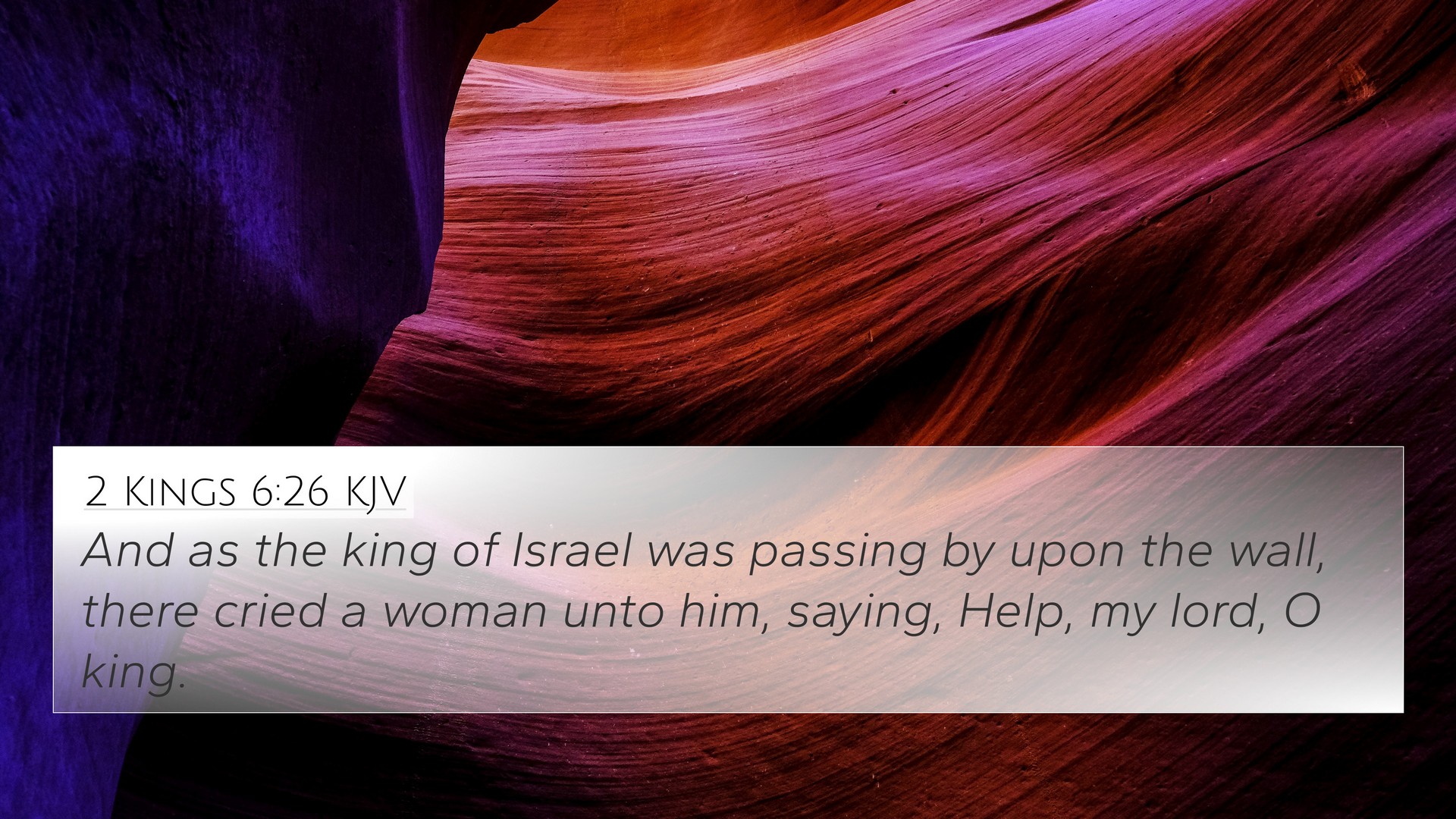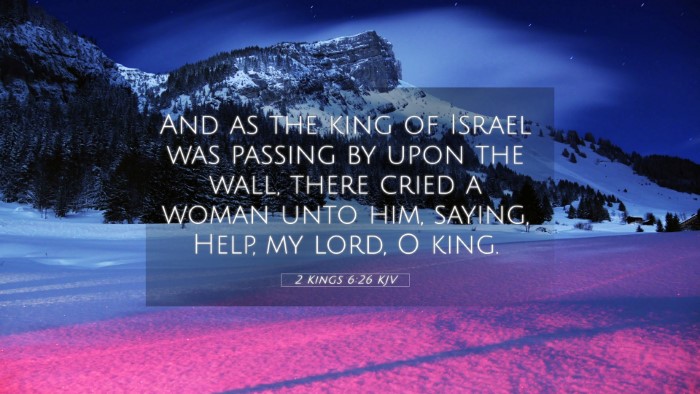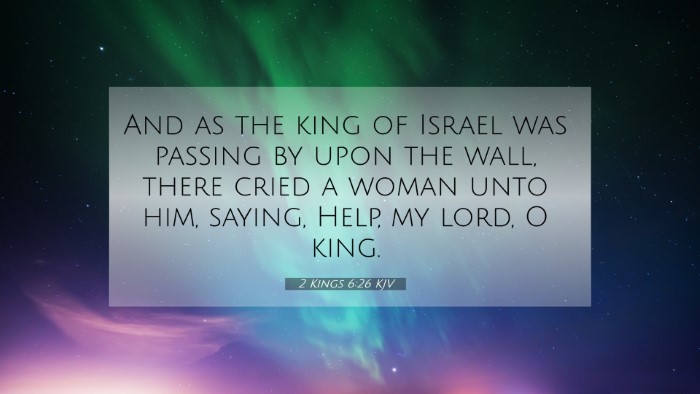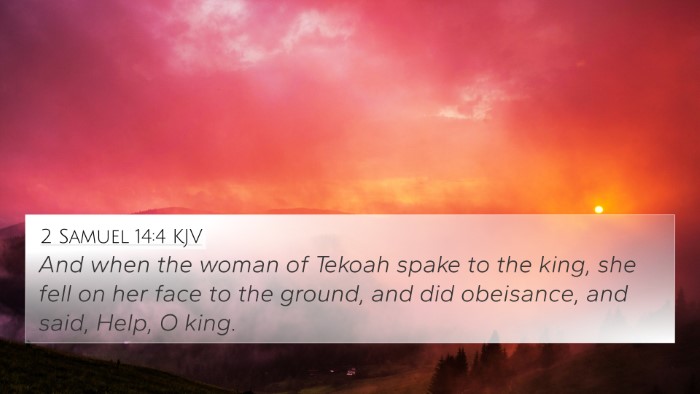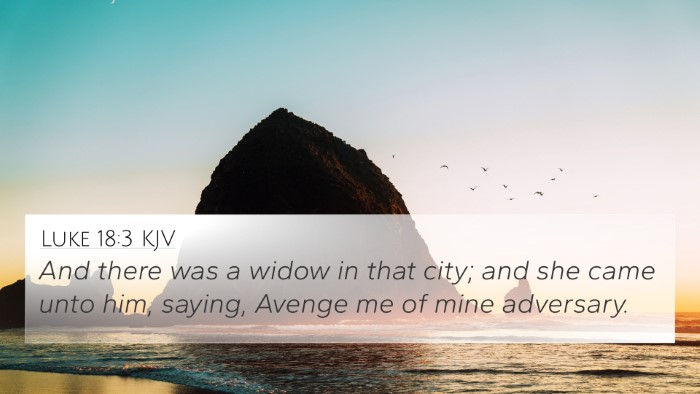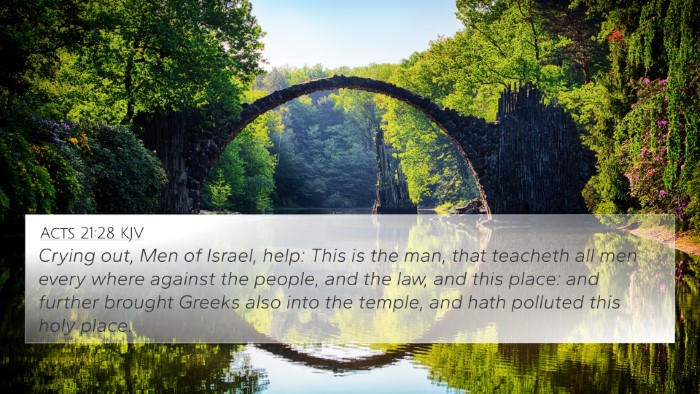Understanding 2 Kings 6:26
In this verse, we witness a profound moment during a time of extreme crisis in the city of Samaria. King Joram of Israel, confronted with a devastating famine due to enemy siege, is approached by a woman struggling with dire circumstances. This passage challenges readers to grapple with themes of desperation, societal decay, and the trials faced by the faithful during difficult times.
Verse Context
2 Kings 6:26 states:
"And as the king of Israel was passing by upon the wall, there cried a woman unto him, saying, Help, my lord, O king."
This scene sets the stage amidst turmoil, where the king seems powerless against the dire needs of his people.
Key Themes and Analysis
- Desperation and Helplessness: At this moment, the woman symbolizes the depth of despair that results from prolonged suffering, resonating with human emotions throughout scripture.
- Leadership in Crisis: King Joram's action (or inaction) reflects on the responsibilities of leaders to respond compassionately in times of societal suffering.
- Divine Providence: The absence of God’s intervention in the narrative highlights the consequences of sin and disobedience in Israel, showcasing the need for divine restoration.
Commentary Insights
Matthew Henry's Commentary
Matthew Henry notes that the woman’s plea reveals how dire the situation had become, stressing the cruelty that can arise from famine. He reflects on the nature of human suffering and highlights the need for reflection on divine providence and mercy during such trials.
Albert Barnes' Notes
Barnes emphasizes the king's failure as a leader to effectively address the needs of his people, illustrating the biblical principle that true kingship involves service to the citizens rather than mere authority. The cry for help underscores the urgency of the situation.
Adam Clarke's Commentary
Clarke delves into the historical context, linking the despair in the city with the broader themes of Israel's unfaithfulness. He suggests that such suffering serves as a reminder of the consequences of turning away from God.
Cross-References to 2 Kings 6:26
To deepen the understanding of this verse, here are 10 related Bible passages that illuminate its themes:
- Lamentations 4:9 - "They that be slain with the sword are better than they that be slain with hunger: for these pine away, stricken through for want of the fruits of the field." (This speaks to the dire consequences of famine, much like in Samaria.)
- 2 Samuel 24:14 - "And David said unto Gad, I am in a great strait: let us fall now into the hand of the Lord; for his mercies are great: and let me not fall into the hand of man." (This verse reflects on choosing divine mercy over human desperation.)
- Isaiah 9:20-21 - "And he shall snatch on the right hand, and be hungry; and he shall eat on the left hand, and they shall not be satisfied." (A commentary on societal decay and the desperation in Israel.)
- Matthew 5:6 - "Blessed are they which do hunger and thirst after righteousness: for they shall be filled." (Contrast to physical hunger with spiritual fulfillment.)
- James 2:16 - "And one of you say unto them, Depart in peace, be ye warmed and filled; notwithstanding ye give them not those things which are needful to the body; what doth it profit?" (This speaks to the necessity of action in the face of suffering.)
- Psalm 37:25 - "I have been young, and now am old; yet have I not seen the righteous forsaken, nor his seed begging bread." (An assurance of God's provision for the faithful.)
- 1 Kings 17:12-15 - The account of Elijah and the widow at Zarephath highlights God's provision during famine. (This narrative parallels the struggle faced by the woman in 2 Kings 6:26.)
- Galatians 6:2 - "Bear ye one another's burdens, and so fulfill the law of Christ." (A reminder of the collective responsibility to care for one another.)
- Matthew 14:16 - "But Jesus said unto them, They need not depart; give ye them to eat." (Emphasizes the role of compassion and providing for others in times of need.)
- This cross-reference highlights a thematic connection to the response during crises in a leader’s role in alleviating suffering.
Applying the Insights
When exploring 2 Kings 6:26, one can use Bible concordances and cross-reference systems to uncover deeper meanings and connections. Utilizing tools for Bible cross-referencing not only enriches one’s understanding but also allows for a comprehensive Bible cross-reference guide that can be invaluable for study and teaching.
Conclusion
The despair of the woman in 2 Kings 6:26 serves as a poignant reminder of the suffering that can arise in a community, reinforcing the importance of compassion and divine intervention. By understanding the interconnections through cross-referencing Biblical texts, we see that the is a collective narrative about resilience, seeking help, and the nature of divine providence during trials.
